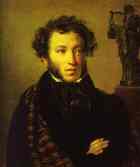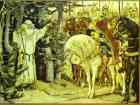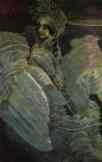Alexander Pushkin
 Pushkin,
Alexander Sergeevich (1799-1837), greatest Russian poet, "the
Sun of Russian Poetry". On his father's side he was the descendent of a
very old but not wealthy family, on his mother's side he was the great-grandson
of Abram Petrovich Hannibal, the son of the ruler of an African tribe,
who was captured by slave traders and sold to the Russian Tsar Peter the
Great, by whom he was named after the famous Hannibal and who raised and
educated the bright child and then awarded him with wealth and hereditary
nobility. Alexander Pushkin was educated in the privileged school
Lyceum, near St. Petersburg. In 1817 he entered diplomatic service, but
was dismissed due to his liberal verses and exiled in 1820 to the South
of Russia and then, in 1824, to his country estate near Pskov. He was allowed
to return by Tsar Nicholas I in 1826. He married
Nataly
Goncharova in 1832. He was killed on the duel by Baron George D'Anthes
de Heckern because of an intrigue involving his wife. Alexander Pushkin
is the author of hundreds of verses, poems Ruslan and Ludmila,
The
Prisoner of the Caucasus,
The Fountain of Bakhcisarai, Tzigani,
the novel in verse
Eugene Onegin, drama Boris Godunov and
other works.
Pushkin,
Alexander Sergeevich (1799-1837), greatest Russian poet, "the
Sun of Russian Poetry". On his father's side he was the descendent of a
very old but not wealthy family, on his mother's side he was the great-grandson
of Abram Petrovich Hannibal, the son of the ruler of an African tribe,
who was captured by slave traders and sold to the Russian Tsar Peter the
Great, by whom he was named after the famous Hannibal and who raised and
educated the bright child and then awarded him with wealth and hereditary
nobility. Alexander Pushkin was educated in the privileged school
Lyceum, near St. Petersburg. In 1817 he entered diplomatic service, but
was dismissed due to his liberal verses and exiled in 1820 to the South
of Russia and then, in 1824, to his country estate near Pskov. He was allowed
to return by Tsar Nicholas I in 1826. He married
Nataly
Goncharova in 1832. He was killed on the duel by Baron George D'Anthes
de Heckern because of an intrigue involving his wife. Alexander Pushkin
is the author of hundreds of verses, poems Ruslan and Ludmila,
The
Prisoner of the Caucasus,
The Fountain of Bakhcisarai, Tzigani,
the novel in verse
Eugene Onegin, drama Boris Godunov and
other works.
See: Feodor Bruni Alexander
Pushkin in the Coffin.
Orest KiprenskyAlexander
Pushkin This portait was considered the best among
poet's other portraits.
Valentin Serov Alexander
Pushkin on a Park Bench.
Vasily Tropinin Alexander
Pushkin.
 Song
of Oleg
Song
of Oleg
Oleg ( ?-912) Prince of Novgorod (879-882) and Prince of Kiev (882-912),
relative to the Viking Ruric, the first Russian Prince. As his own heir
Prince, Igor, was too young, Ruric, before his death, asked Oleg to rule
the country and take care of Igor until he grew up. Oleg fulfilled Ruric’s
will. A legend is connected with the death of Oleg, which became the basis
of Pushkin’s Song of Oleg. Once Oleg met an old mage who prophesied
to him that the Prince would die because of his horse. Though he loved
the horse very much, Oleg ordered it be taken away and kept it far away
from him. Several years passed and Oleg found out that the horse had died.
He came to the place where the dead horse was left, of which only bones
remained. He was sad over the horse and at the same time glad that he had
escaped the prophecy. But while he was standing deep in thoughts over the
bones, a venomous snake emerged from the horse’s skull and bit Oleg. Thus
he died.
See: Victor Vasnetsov Funeral
Feast for Oleg, Oleg Meeting
the Magus.
Stone Guest is a poetic drama, based
on the Spanish legend about Don Juan. Don Juan, a heartless and immoral
man of noble origin, had killed in a duel the commander of Seville, whose
stone statue was erected on his tomb. Once, being near the tomb, Don Juan
met Donna Anna, the widow of the commander, and seduced her. The statue
moved its head in anger. Trying to show off, Don Juan invited the statue
to a banquet. The invitation was accepted, the stone commander came and
crushed Don Juan.
See: Ilya Repin Stone
Guest. Don Juan and Donna Anna.
 Tale
of Tzar Saltan is a beautiful poetic tale, in which Tzar Saltan by
means of wicked intrigues was separated from his beloved wife and son,
Prince Guidon, who were put into a barrel and thrown into the ocean.
The ocean brought the barrel onto a barren island. Prince Guidon, researching
the island, saw a bird of prey who was trying to kill a swan. Guidon killed
the bird and released the swan. The swan appeared to be a fairy princess,
and she started to help Guidon, presenting him with various miracles: she
created a large city with a palace, which was guarded by 33 warriors of
the ocean; gave Guidon a miracle squirrel, which produced golden nuts;
helped Guidon to secretly see his father, Tzar Saltan. As a result Guidon
understood that his father was not guilty in the “death” of his wife and
son. Then the Swan Princess agreed to marry Guidon and at last made Saltan
come to the island and re-unite with his family.
Tale
of Tzar Saltan is a beautiful poetic tale, in which Tzar Saltan by
means of wicked intrigues was separated from his beloved wife and son,
Prince Guidon, who were put into a barrel and thrown into the ocean.
The ocean brought the barrel onto a barren island. Prince Guidon, researching
the island, saw a bird of prey who was trying to kill a swan. Guidon killed
the bird and released the swan. The swan appeared to be a fairy princess,
and she started to help Guidon, presenting him with various miracles: she
created a large city with a palace, which was guarded by 33 warriors of
the ocean; gave Guidon a miracle squirrel, which produced golden nuts;
helped Guidon to secretly see his father, Tzar Saltan. As a result Guidon
understood that his father was not guilty in the “death” of his wife and
son. Then the Swan Princess agreed to marry Guidon and at last made Saltan
come to the island and re-unite with his family.
The Russian composer N. Rimsky-Korsakov wrote an opera on the subject
of Tzar Saltan (1900).
See: Mikhail Vrubel. Guido,
Swan
Princess.